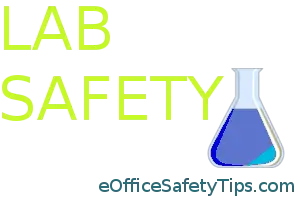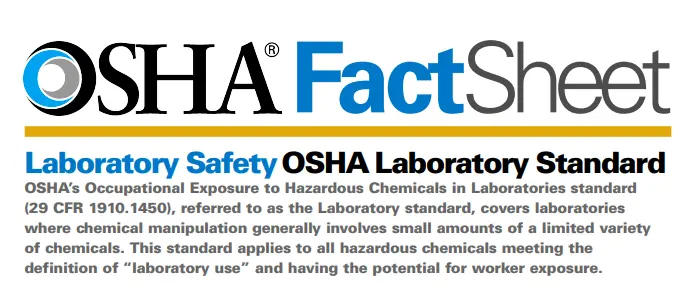Safety In The Lab

Working in a lab can be a very rewarding job it, however it can also be a very dangerous job unless you train yourself to make lab safety your top priority! There are many jobs that require people to handle hazardous and possible harmful materials everyday. If you are unaware of the correct handling procedures it could result in severe injury of even death. Safety in the lab is extremely important to everyone in the building because any accident could start a fire or release toxins into the air. Here are a few tips on how to work safely in any lab.
Top Safety Concerns in the Lab
- Fires & Explosions in the Lab
- Chemical Burns
- Absorbing Chemicals Into Your Skin
- Eye Irritation
- Heat Induced Burns
Let's face it, of the many horrific things that can go wrong, few inspire the same terror as seeing the entire lab completely engulfed in flames.
Working with chemicals in a laboratory is a little more complicated than is was in grade school science class. The dangers of certain chemicals when they come into contact with the skin is well known. Often improper handling of chemicals can result in contact with the skin of your hand, arm, and god forbid face.
Personally this has always been my reason for maintaining the strictest safety precautions when doing lab work. Chemicals accidentally absorbed through the skin can be the most insidious safety concern, as the effects are not always immediately apparent. Wondering whether or not you remembered to take the right safety firsty measures when working with a chemical you know to be dangerous may do more than keep you up at night. Obviously all standard safety measures should taken if not extra precautions if you are working with an open sore, cut or scrape to your skin.
Similar to protecting yourself from chemical exposure to your skin, protecting your eyes is just as important (more important for my personal phobias). Safety goggles should be worn to always protect your eyes from accidental splashes. Wearing safety goggles can also prevent damage or irritation to the eye from open flame sources or excessive heat.
Again stepping away from the simplicity of the good old fashion bunsen burner we all know the dangers of burning oneself does not stop there. Many times we find ourselves operating open flames in the process of working in the laboratory. It is imperitive to also wear protective safety equipment in the situations.
The above are the five top safety hazards to be aware of when working in laboratories. Continue to read for tips on how to avoid these lab safety hazards, and some general mistakes you may not want to make.
Tips for Safety In The Lab
- Keep all work areas clean and free of clutter. You are less likely to spill something on an area that is free of clutter. that helps to keep common germs for entering your system and a respirator mask which keeps out most toxic fumes. You could also wear a full body suit if the job requires as well as gloves and safety goggles.
- Never take any food or drinks into a laboratory they could become contaminated. Always eat in designated break areas.
- If any chemicals should get into your eyes find the nearest eye wash station and rinse your eyes while having someone else call 911 for you.
- Chemical burns are a serious matter they can scar you for the rest of your life or leave irreversible damage to body parts. If you accidentally spill chemicals on yourself find the closet shower station. While you are washing have somebody call 911. After you get out put on the sanitized paper clothes that are near the wash station.
- If you breath in to many toxic fumes and are beginning to feel ill. Leave the room, go outside and get some fresh air. If you have to sit down do not allow your head to fall below your knees this makes it difficult to breath and may cause choking if you vomit.
- Make sure every person in the lab knows where the first aid kit and fire extinguishers are located and that they are trained in the proper use of the equipment.
- If toxic chemicals spill be sure to contact the correct companies to come clean it up. Also if it is a extremely toxic chemical it is probably best to evacuate the building until it is taken care of.
- Be sure that all chemicals are stored properly. This means in the correct containers and they are kept at the correct temperatures.
- Never mixes chemicals together if you are unsure what the final result will be you may accidentally make an extremely dangerous toxin.
- Make sure to turn off all burners before leaving the lab. Also be sure to turn off any equipment you may have used that day.
- If a large chemical spill occurs you must call the EPA and inform them of the situation. They will tell you the next step to take which could be evacuating the area or how to dispose if that chemical properly.
- Always dispose of used lab chemicals properly. Do not just throw them in a trash bin. Use the correct chemical disposal bins that the EPA provides to all companies that use chemicals.
These are just a few ways to stay safe in the lab. Use your common sense if something feels wrong it probably is. Safety in the lab is the only way to go. Think,look and listen at all times when you are using dangerous or toxic chemicals. There are no second chances if you spill something and injury a person.
Staying Aware of the Elements of the OSHA Laboratory Safety Standard

Considering that over a half million people make up the workforce that is involved with conducting their daily jobs in the laboratory, knowing the keys to successful safety measures maintains a work environment in which everyone can thrive. With so many folks employed in this area, it is important to remind both those new to the field, as well as experienced lab vets to keep safety a priority. Some of the most dangerous conditions can be found when conducting experiments in a laboratory, regardless of the specificity of the work at hand.
There are certainly more than enough resources available to ensure both safety compliance as well as measures to secure a sound workplace. OSHA maintains a Lab Safety Standard that should most certainly be observed at all times. The PDF document provided in the link covers all the elements of the lab safety standards put forward by OSHA. This covers all laboratories and lab condition such as clinical, academic, as well as industrial lab environments. Regardless of the type of Laboratory in which you work it is import to review the entire standard as it covers everything from cancer causing agents to hazardous chemical safety. Make yourself aware of OSHA safety best practice standards and keep yourself safe when working in your labs all!
Stupid Things To Avoid in the Lab
First day in the lab? Don't want to make the traditional stupid rookie mistakes? Read on!
- Don't store dangerous, toxic, explosive, or corrosive materials on shelving units above your head level. As a matter of fact, consider those that may be shorter than yourself who also work in your lab.
- Don't use your mouth for the purposes of siphoning liquids from a container or any other fashion of pipette.
- Remember not to wear contact lenses when working in the lab. No, that's right, I know what you are thinking; Safety goggles may not be enough to protect you and your contact lenses from danger. Be smart, be safe, and avoid contact lenses in the lab altogether.
- Label things appropriately! Right? - Right!
- Don't store explosive materials or containers in precarious locations! Store them safely out of the way!
- Always wear the safety gear, regardless of how ridiculous you may personally think it may be. C'mon, it's a no brainer.
- Don't Inhale Toxic Fumes Rookie!
- Don't burn yourself!
- Take extra measures to cover and protect any cuts, scrapes or otherwise exposed area of the skin.
- If you have accidental skin exposure to a chemical, act! Wash or otherwise protect yourself!
- Keep loose clothes and long hair properly secured as to avoid unintended accidents.
- Maintain proper storage containers and replace when required.
Though most of these things may seem like something you didn't think we had to mention. I assure you, you are correct. However, just in case, we chose to mention it all anyway.
